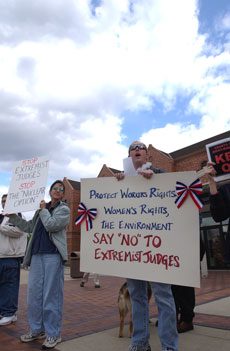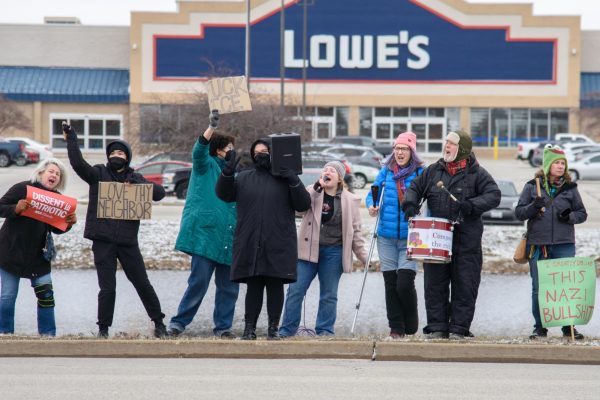Local residents defend filibuster

Online Poster
Apr 28, 2005
Last updated on May 11, 2016 at 08:56 p.m.
More than 60 protesters gathered in front of the Champaign County Courthouse Wednesday in response to Republican threats to revoke senators’ rights to filibuster judicial nominees.
The change, discussed by Senate Republicans for weeks, would most likely allow the confirmation of seven of President Bush’s federal judicial appointments that Democrats have been able to block thus far. It would require only 51 votes to confirm a nominee; currently 60 votes are needed to prevent a filibuster, in which a senator halts all business in the Senate by refusing to stop speaking on the floor. Republicans currently hold 55 Senate seats.
Bush made the seven judicial nominations during his first term, but Democrats used filibusters to defeat the candidacies. Bush renominated the seven judges following his re-election last November.
While several protesters said they opposed the blocked judicial nominees, they said the rule change was more important because it would alter a practice senators have had since 1806.
Get The Daily Illini in your inbox!
“It is not the most perfect system, but it has endured 200 years and it has worked,” said Jim Hall, who described himself as a political independent. “Do you really want one party to be in control of your government?”
Removing the filibuster for judicial nominees “is a precedent that really messes with the tradition of working together and compromise,” said Urbana resident Kate Maurer.
Republicans have countered by saying judges deserve a vote on their nomination. Republicans say a super-majority of 60 votes is too high a requirement to confirm a judicial nominee because the Constitution only requires “the advice and consent of the Senate” – meaning a simple majority.
“Democratic senators should abandon their unprecedented judicial filibusters, give the nominees a fair up-or-down vote and move quickly to approve an Energy Bill, Highway Bill and other critical items on America’s agenda. Obstruction doesn’t advance anyone’s agenda,” stated Bob Stevenson, Senate Majority Leader Bill Frist’s communication director, in a press release.
Wednesday’s protest in Urbana came after the political action committee MoveOn encouraged people to take part in rallies across the nation – including one in Washington, D.C., led by former Vice President Al Gore. The protests were meant to discourage Frist from invoking the “nuclear option,” so called because it is seen by some as an option of last resort with catastrophic consequences. Democrats have vowed to block the rest of the GOP agenda if Frist revokes the filibuster rule.
Several of the protesters in Urbana held signs such as “Filibuster fission is not an option,” as they chanted while cars passed by. Some vehicles supported the demonstrators by waving and honking their horns.
Other demonstrators spoke briefly in support of the current filibuster rule.
“It’s not fair to say, ‘We’re not getting our way so we’re going to change the rules,'” said graduate student Aimee Johansen Alnet.
Hannah Son, senior in LAS, said the protest was important.
“It’s important people know what’s at stake,” Son said. “What they count on is that people will feel totally disempowered.”
The MoveOn-sponsored rallies were the latest political maneuver in what has recently become a hot political issue.
Conservatives who support the filibuster’s repeal for judicial nominations have also been making noise. The Family Research Council held an event titled “Justice Sunday” in Louisville, Ky., last Sunday that featured Frist in a videotaped address.
The event was rebroadcast again on Tuesday on Christian networks around the country.
“We’ve had extremely positive feedback,” said FRC spokeswoman Amber Hildebrand.
She said while the event was successful and generated several calls to Congress supporting their position, there were no immediate plans for similar events.
On Princeton University’s campus, hundreds of protesters have been taking part in a symbolic filibuster of their own that has run continually since 11 a.m. on Tuesday. Asheesh Saddique, who helped organize the event, said close to 150 people had read continually from texts as varied as history books to the controversial nominees’ court decisions by late Tuesday afternoon.
The demonstration was also symbolic because it was held in front of the Frist Campus Center, named after the Tennessee senator’s family, who funded the building.
Protecting the filibuster was important, Saddique said. He spoke on his cell phone over chants from the rally.
“These appointments are for life. You want to make sure you’re appointing the right people,” he said.
An end to the filibuster would be damaging to the traditional system of government, said Saddique, who is also the editor of the Princeton Progressive Review, a left-leaning monthly magazine.
“It will negatively affect democracy because one of the things we do in a democracy is protect the minority,” he said.
There was no end planned for the Princeton demonstration, but Saddique said the event was scheduled to last at least through Wednesday night.
In an ABC News-Washington Post survey published on Tuesday, 66 percent of respondents were opposed to changing Senate rules to make it easier to confirm judicial nominees, while 26 percent supported rule changes. The results had a three-point margin of error, according to the study.





